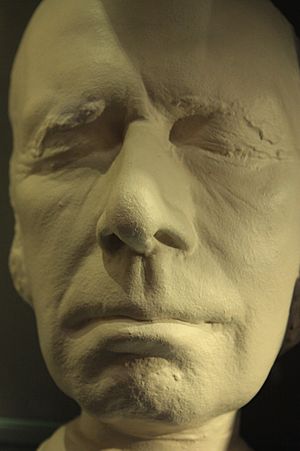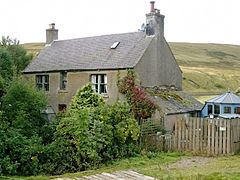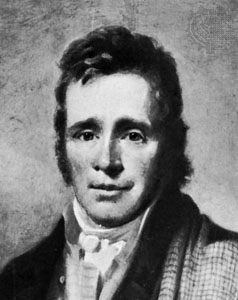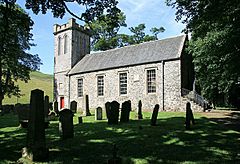James Hogg facts for kids
Quick facts for kids
James Hogg
|
|
|---|---|
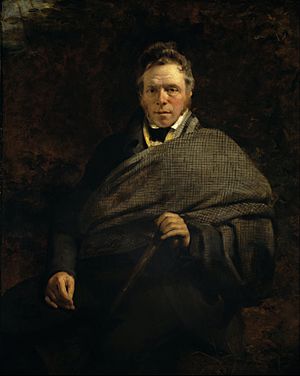
Portrait by Sir John Watson Gordon, 1830 (Scottish National Gallery)
|
|
| Born | before 9 December 1770 Ettrick, Selkirkshire, Scotland |
| Died | 21 November 1835 (aged 64) Ettrick, Selkirkshire, Scotland |
| Occupation |
|
| Period | 1794–1835 |
| Notable works | The Private Memoirs and Confessions of a Justified Sinner |
| Spouse | Margaret Phillips |
| Children | Elizabeth Hogg; James Robert Hogg; Harriet Sidney Hogg; Jessie Hogg; Margaret Lydia Hogg; Mary Gray Garden; Catherine Hogg |
James Hogg (1770 – 21 November 1835) was a Scottish writer. He wrote poems, novels, and essays. He used both the Scots language and English.
When he was young, James worked as a shepherd and farmhand. He learned mostly by reading books on his own. He became friends with famous writers like Sir Walter Scott. James Hogg was known as the "Ettrick Shepherd". Some of his books were published under this name. He was also a character in a popular magazine series called Noctes Ambrosianae.
Today, he is best known for his novel The Private Memoirs and Confessions of a Justified Sinner. Other important works include his long poem The Queen's Wake (1813). He also wrote a collection of songs called Jacobite Relics (1819). His novels The Three Perils of Man (1822) and The Three Perils of Woman (1823) are also well-known.
Contents
Biography
Growing Up in Scotland
James Hogg was born on a small farm. It was near Ettrick, Selkirkshire, Scotland, in 1770. His exact birth date is not known. He was baptized on December 9, 1770.
His father, Robert Hogg, was a farmer. His mother, Margaret Hogg, was known for collecting Scottish ballads (old songs). Margaret's father, Will o' Phawhope, was said to be the last person in the Border country to talk with fairies.
James was the second oldest of four brothers. His brothers were William, David, and Robert. Robert and David later moved to the United States. James and William stayed in Scotland their whole lives.
James went to a local school for only a few months. His family faced money problems. His father lost his sheep farming business. James then had to stop school.
He worked as a farm helper when he was young. He looked after cows and helped on the farm. He also assisted shepherds. He learned about stories and literature from the Bible. He also heard tales from his mother and uncle.
In 1784, he bought a fiddle with his savings. He taught himself to play it. He worked for different farmers. In 1788, he got his first job as a shepherd. He stayed there for two years. He learned to read while watching sheep. His employer's wife gave him newspapers and religious books.
In 1790, he started working for James Laidlaw at Blackhouse. This was in the Yarrow valley. Hogg later said Laidlaw was like a father to him. Laidlaw saw how hard James worked to learn. He offered James books from his own library. He also helped him use a local library.
Hogg also started writing songs for local girls to sing. He became a lifelong friend of William Laidlaw. William was his master's son and later helped Walter Scott with his writing. During this time, James and his cousins formed a debating club for shepherds.
In 1797, Hogg first learned about the poet Robert Burns. He heard the poem Tam o' Shanter read aloud. Hogg wrote plays and songs during this period. His work as a sheep drover made him interested in the Scottish Highlands. In 1800, he went back to Ettrickhouse to help his parents. In 1801, he published a small book called Scottish Pastorals. His patriotic song "Donald Macdonald" became very popular around 1803.
Starting His Writing Career
In 1801, James Hogg was asked to collect old songs. These were for Walter Scott's book, Minstrelsy of the Scottish Border. He met Scott the next year. He also started working for the Edinburgh Magazine. In 1802, he traveled to the Highlands three times. He hoped to find a farm of his own. He found a farm on Harris. But he had money problems and legal issues. He could not get the farm by 1804.
His travel experiences were written in letters to Scott. These were published in the Scots Magazine. In 1803, he met the novelist John Galt. From 1805 to 1806, he worked as a shepherd in Dumfriesshire. He met and became friends with the poet Allan Cunningham.
Hogg's first book, The Mountain Bard, came out in 1807. He continued to work as a sheep-grazer. But his debts grew from 1808 to 1809. In 1810, he moved to Edinburgh to become a full-time writer.
He started his own magazine, The Spy, in 1810. It lasted for one year. He also helped start a debating group called The Forum. In 1812, he wrote a long poem. The Queen's Wake was published in 1813 and was a big success. It was a collection of stories told in verse. Kilmeny from this collection became very famous.
In 1814, Hogg wrote another long poem, The Pilgrims of the Sun. That same year, he met William Wordsworth. He visited the Lake District to see Wordsworth and other poets. In 1815, the Duke of Buccleuch gave him a small farm. He could live there for free for his whole life. He kept writing songs and poems. His poem Mador of the Moor was published in 1816. Later that year, he published The Poetic Mirror, which was also very successful.
Hogg met the publisher William Blackwood in 1817. He helped start Blackwood's Edinburgh Monthly Magazine. In 1818, his book The Brownie of Bodsbeck; and Other Tales was published. Hogg was also busy with his work Jacobite Relics. In 1819, he asked Margaret Phillips to marry him. He published the first volume of Jacobite Relics that year.
He married Margaret Phillips on April 28, 1820. His second collection of tales, Winter Evening Tales, came out a month later. His father died at the end of that year. The second volume of Jacobite Relics was published in 1821. His son, James Robert Hogg, was born in March 1821. Around this time, Hogg started having serious money problems.
Hogg became famous through the Edinburgh Monthly Magazine. It was later renamed Blackwood's Magazine. This magazine was known for its strong opinions and sometimes harsh reviews of other writers. Hogg often found himself joked about in its pages. The magazine became very popular.
In 1822, the magazine started Noctes Ambrosianae. These were imaginary talks in a pub. They featured characters like "The Ettrick Shepherd," who was James Hogg. These talks continued until 1834. The Shepherd character was shown as a simple country person, but also very wise. He became a well-known figure in the literary world. The real James Hogg sometimes felt upset about how he was shown.
Hogg's Poetical Works were published in four books in 1822. His novel The Three Perils of Man also came out. In 1823, Hogg began publishing parts of his work The Shepherd's Calendar in Blackwood's Edinburgh Magazine. Later that year, he published his novel The Three Perils of Woman.
In June 1824, he published his most famous book, The Private Memoirs and Confessions of a Justified Sinner. His long poem Queen Hynde was published at the end of the year. In 1825, he found a new way to publish his work. He started writing for a yearly book called the Literary Souvenir.
In 1826, Hogg faced serious money problems. His debts began to lessen in 1827. His Shepherd's Calendar pieces were being published. He also received more requests to write for other yearly books. His father-in-law died, which helped him financially as he had been supporting his family. His collection Select and Rare Scotish Melodies was published in 1829. The Shepherd's Calendar was published as a book in 1829.
Later Life and Death
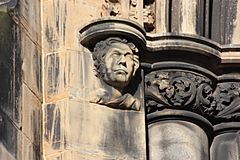
In 1830, he started writing for a new magazine, Fraser's Magazine. This helped him with his money troubles. At the end of the year, he met Walter Scott for the last time. In early 1831, Hogg's Songs, by The Ettrick Shepherd was published. His last child, Mary, was born in August. He had a disagreement with Blackwood and decided to publish his books in London.
In 1832, his Altrive Tales was published in London. Blackwood finally published A Queer Book in April or May. Hogg was offered a lot of money to edit a collection of Robert Burns's works. But his London publisher went out of business. This stopped the publication of his Altrive Tales after only the first book.
In 1833, Hogg had an accident while curling. He fell through the ice and became very ill. In 1834, his book Familiar Anecdotes of Sir Walter Scott was published in the United States. A copied version in Glasgow caused problems with Lockhart. Hogg made up with Blackwood in May, but Blackwood died at the end of the year. Hogg published Tales of the Wars of Montrose in March 1835.
James Hogg died on November 21, 1835. He was buried in Ettrick Churchyard. This was near his childhood home in the Scottish Borders. In 2021, his grave was moved for safety reasons. The community planned to restore it.
Wordsworth wrote a poem about Hogg in 1835. It included these lines: "This eulogy notwithstanding, Wordsworth's notes state 'He was undoubtedly a man of original genius, but of coarse manners and low and offensive opinions.'"
Legacy
During his lifetime, many people admired James Hogg. They admired him for overcoming his humble beginnings. He was seen as a very talented writer. People thought his rough style was natural for the "Ettrick Shepherd" character.
After Hogg's death, his works were collected and published. Some parts were removed to fit the tastes of the time. Later, in the 1860s, another collection was made. Some works, like The Three Perils of Woman, were left out completely. Because of these changed books, readers in the Victorian era thought Hogg was not as great as once believed. They saw him mainly as an example of someone who succeeded despite challenges.
This view began to change in 1924. A French writer, André Gide, read Justified Sinner. Gide was very impressed. He wrote that he had not been so moved by a book in a long time. The book was republished in 1947 with Gide's introduction. This helped people today appreciate this novel.
Interest in The Confessions led to other works by Hogg being rediscovered. Now, his novel The Three Perils of Woman is also seen as a classic. All his works, including his letters, are being published in new editions. Justified Sinner remains his most important work. It is now considered a major Scottish novel. It explores important ideas about Scottish culture and Calvinism.
In 2006, Scottish novelist Irvine Welsh said Hogg, especially The Confessions, greatly influenced his writing. A James Hogg Society was started in 1981. It helps people study his life and writings. Hogg's story "The Brownie of the Black Haggs" was made into a radio play in 2003.
Thomas Wilson's opera, The Confessions of a Justified Sinner (1972–75), is based on the novel.
A bill Hogg issued to buy lambs in 1824 is shown in the Museum on the Mound, Edinburgh.
Hogg is a direct ancestor of the Nobel Prize-winning Canadian writer Alice Munro.
Works
Poetry
- Scottish Pastorals (1801)
- The Mountain Bard (1807)
- The Forest Minstrel (1810)
- The Queen's Wake (1813)
- The Pilgrims of the Sun (1815)
- Mador of the Moor (1816)
- Queen Hynde (1824)
- Winter Evening Tales (1820) - This book also contains short stories and novellas
- A Queer Book (1832)
Non-Fiction
- The Shepherd's Guide (1807) (a book about sheep)
- The Spy (1810–11) (a weekly magazine)
- The Shepherd's Calendar (1829) (collected essays)
- Familiar Anecdotes of Sir Walter Scott (1834) (a memoir)
- A Series of Lay Sermons (1834) (moral and religious talks)
Prose Fiction
- The Brownie of Bodsbeck (1817) (novel)
- The Surpassing Adventures of Allan Gordon (1818) (novella)
- Winter Evening Tales (1820) (short stories, novellas)
- The Three Perils of Man (1822) (novel)
- The Three Perils of Woman (1823) (novel)
- The Private Memoirs and Confessions of a Justified Sinner (1824) (novel)
- The Brownie of the Black Haggs (1828) (short story/tale)
- Altrive Tales (1832) (short stories)
- Tales of the Wars of Montrose (1835) (short stories)
- Tales and Sketches of the Ettrick Shepherd (1837)
Songs
- Jacobite Relics (1819) (collection of Jacobite protest songs)
- Songs, by The Ettrick Shepherd (1831) (songs)
See also
 In Spanish: James Hogg para niños
In Spanish: James Hogg para niños
- Aikwood Tower, the home of Lord Steel, has an exhibition about James Hogg's life and work.
- Jean Lorimer (Chloris)
 | Audre Lorde |
 | John Berry Meachum |
 | Ferdinand Lee Barnett |


